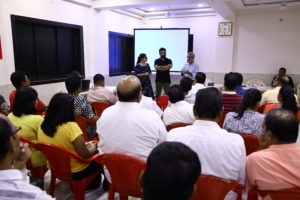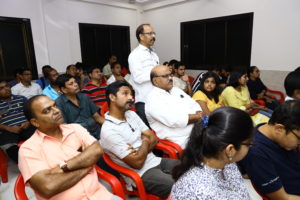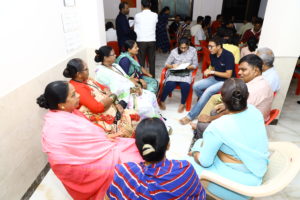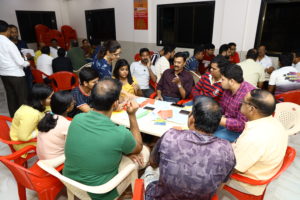Jai and Ketaki Bhadgaonkar (Bombay 61) give this report from the Ideation Workshop in Mumbai for the TAPESTRY project.
Versova Koliwada is one of the most thriving fishing villages in the city of Mumbai. It is important to address the concerns and uncertainties around the sustenance of those who live in this village. The TAPESTRY project is bringing attention to Versova’s fishing community in Mumbai – the Kolis – who face an uncertain future as a result of global climatic concerns and loss of livelihood. This project creates an opportunity to establish close interactions with the community, to understand their concerns and initiate transdisciplinary dialogue to coproduce transformative actions that envision sustainable development.
By recognising the skills and knowledge of the Koli community, the Bombay 61 team foresees an opportunity to collectively bring a change for improving local conditions. A workshop was organised in the village to initiate a dialogue regarding the TAPESTRY project with the local Koli organisations and the community. It brought together people from different social layers in the community, resulting in an enriching environment to brainstorm ideas that can assist adaptation, well-being, transformation and preservation of the area’s identity.
Ideation Workshop
The ideation workshop was a one-day participatory workshop that collectively brought together the local fishers, women, youth, leaders (men and women) and the TAPESTRY Mumbai team. The workshop began with an open discussion and responses from the locals.
The locals brought forward their insights and concerns about their village. The concerns focused on the city context, local village issues, their understanding of climate change, as well as challenges and uncertainties of fishing as a livelihood. As a result of the general discussion, four themes emerged. Based on these, the participants were divided into groups to bring forth detailed perspectives on the issues.
Each group shared their knowledge, emotions, questions and feelings on their group’s theme. The group discussions encouraged ideation (the formation of ideas or concepts) for devising solutions through a brainstorming session. The ideation exercise establishes a guideline for the transformative initiatives that will be an integral part of the TAPESTRY Project.
Creek and Solid waste management
The creek is where the fresh water mixes with the salt water, making it the best breeding ground for fish. However, the pollution levels in the Versova creek are alarming and the Koli fishers highlight the loss of marine life in the coastal waters over the years. ‘There has been a steep decline in the fish catch within the creek,’ remarked one of the fisher participants. ‘The smell, the colour and the floating plastic waste are enough evidence to prove the condition of the water. We catch more plastic in the nets than the fish.’
The creek has about 12 inlets which flow from different parts of the city and collectively bring a lot of city waste into the creek. During the low tide, the currents flush out all the solid waste which then settles on the coasts of the village. The solid waste, mainly plastic, needs to be collected or stopped at the source of these 12 inlets to avoid it getting mixed up with sand on the shore. Installing net filters at certain intervals in the water channels will help to clean the creek considerably. This issue is connected with another serious concern for the conservation of mangroves, which are threatened due to the pollution and the destruction for urban development projects.
Livelihoods and economies
Climate change, developmental pressures, ecological deterioration and changing aspirations have led to uncertainties in fishing as a livelihood. In recent years, most of the Kolis have had to sell their boats due to the economic losses. As other job opportunities are scarce, the Koli women are forced to buy fish from other boats coming to the shore (as they have sold their own). For those who have boats, there is not enough business to sustain them. The Kolis said they want everything to be like ‘before’ for them; plenty of fish and good business. The changing aspirations and the uncertainties of the fishing business force younger generations to quit the traditional livelihood and pursue other conventional jobs in the city.
Subsequently, the Versova Kolis voice a grave concern over the loss of livelihoods and economies. It was observed in the discussions that the community depends a lot on the government to provide them with subsidies, reservations and compensations. The outcomes of the workshop draw attention to the urgency of improving the existing fishing economies, and developing alternatives. Suggestions from the community hinted at the possibility of developing inland fishing, promoting online business, fish processing, marketing seafood and the medicinal values of the fish; all of which can be explored as transformative actions during the TAPESTRY Project.
climate change, Community mobilisation and empowerment
The ideation workshop helped the team to begin a discourse with the local Koli community at Versova on awareness of climate change uncertainties and adaptability. One of the Koli women mentioned that the interference of developers and other development pressures gives rise to fear of their displacement. The Kolis all across Mumbai are struggling to claim their property rights through the legal demarcation of village boundaries. The feeling of losing their ownership and cultural identity seems critical due to the blurry ownership rights as well as livelihood uncertainties.
The locals were assertive that they should be able to restore their ‘zamin’, ‘dhanda’, and ‘samaj’ (land, livelihood/ business, and community). Community empowerment and sense of ownership (identity) appeared to be central notions for leading a path towards co-production and sustainable development.
Participation, interaction and ideation were primary motives for the ideation workshop, to help formulate transformative interventions and form a core group of local fishers, young professional Kolis and members of the Bombay 61 team. This group will be central to the implementation process of TAPESTRY in Mumbai, as well as the post-implementation assessment following the course of the research project.
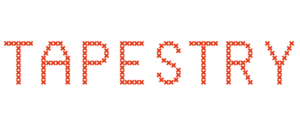 This blog post draws on a visit undertaken as part of TAPESTRY, a new transdisciplinary project which explores how transformation may arise ‘from below’ in marginal environments with high levels of uncertainty.
This blog post draws on a visit undertaken as part of TAPESTRY, a new transdisciplinary project which explores how transformation may arise ‘from below’ in marginal environments with high levels of uncertainty.
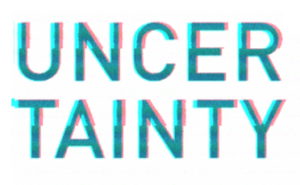 Uncertainties can make it hard to plan ahead. But recognising them can help to reveal new questions and choices. What kinds of uncertainty are there, why do they matter for sustainability, and what ideas, approaches and methods can help us to respond to them?
Uncertainties can make it hard to plan ahead. But recognising them can help to reveal new questions and choices. What kinds of uncertainty are there, why do they matter for sustainability, and what ideas, approaches and methods can help us to respond to them?
Find out more about our theme for 2019 on our Uncertainty theme page.

